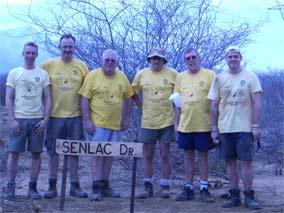 Valerie Cocker is 68 and came on the February expedition to the clinic site. Here she gives her account of an amazing journey to see the unit being built in her husband’s name.
Valerie Cocker is 68 and came on the February expedition to the clinic site. Here she gives her account of an amazing journey to see the unit being built in her husband’s name.“I have recently returned from visiting the Pokot tribe at Tikeet, in the bush of north west Kenya. I went with the Yellowmen of Kadongdong, better known as members of Senlac Rotary Club. I went to dedicate a Hospital Unit in Tikeet in memory of my late husband John.

I travelled with one of my daughters, Helen, and two of our oldest friends Lindsey and Peter Lawrence. After a 12 hour minibus ride in difficult conditions we reached Marich Study Centre, our home for a week. The clinic site was a further hour’s drive through the bush over sometimes treacherous terrain and in temperatures reaching 104F.
We had not appreciated how difficult it was to get there, to work in the heat, and to carry everything we needed including drinking water. It was amazing to see the Yellowmen working alongside the Pokot tribespeople. They checked the progress of the clinic buildings, built with 7000 bricks the women of the tribe had previously made by hand with money raised through donations. The Yellowmen then started work on two blocks of latrines, a vital part of the site, which the local people have now completed.
The mortality rate of young children is high, as an incident during our visit showed. The life of a two year old boy was undoubtedly saved because we were on hand to transport him to a hospital some considerable distance away in time for him to receive the necessary medical attention. This highlighted to us just how urgent it is to get the Tikeet hospital up and running.
The clinic buildings are up to the roof level, but now we need to “raise the roof” on the John Cocker unit and the rest of the buildings.
With the Yellowmen, I am helping to raise funds to put roofs on the wards and provide clean water for the clinic so it can open. We are also planning to put in solar panels for electricity and equip the clinic with everything from the basics, such as beds and bedding, and as much medical equipment as we can provide. For this we need donations and sponsorship.
People can help in a variety of ways. By sending an individual or group donation, by getting a club or society to adopt this as their major fund raiser or by sponsoring a roof truss, or beds, or a roofing sheet with their name on it. It’s something that I’m very passionate about, and having seen the clinic, I’m even more determined to make sure it opens as soon as possible.
I was so glad I made the journey, although it was a very emotional trip, we all agreed on that. It was also quite taxing, what with the heat and the dreadful roads, but all felt it was a privilege to be included. The Yellowmen not only work so very hard once in Kenya, but to get there they and their families make sacrifices to pay for the fares.”


